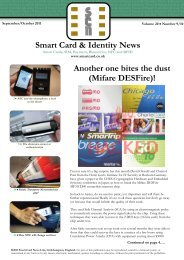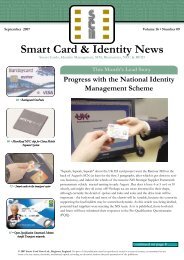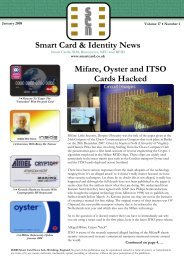Smart Card & Identity News A New Flavour for eCash
Smart Card & Identity News A New Flavour for eCash
Smart Card & Identity News A New Flavour for eCash
Create successful ePaper yourself
Turn your PDF publications into a flip-book with our unique Google optimized e-Paper software.
The second approach to handling low value payments is to have some <strong>for</strong>m of aggregation. What you want to do<br />
is to avoid the 4-P overheads of handing individually small value transactions. <strong>Card</strong>is is a company<br />
http://www.cardis-international.net/ that has been working on this <strong>for</strong> some time with a scheme that does<br />
effectively aggregate small transactions leading to reduced costs. They have recently announced that Austria’s<br />
Raiffeisen Bank International is to use <strong>Card</strong>is software plug-in <strong>for</strong> low value payments in Q2 this year.<br />
The other approach to aggregation is effectively a subscription model where you lodge funds with a service<br />
provider on a pre or post-paid relationship. What is clear is that you are effectively setting up an account with the<br />
service provider and although it is a closed system (only you and the service provider) there are still the<br />
overheads of the service provider having to authenticate the consumer requests. This part of the transaction is<br />
no different to the 4-P model and if the scheme is post-paid then there is also the risk overhead of the service<br />
provider not being paid. Apple’s iTunes is effectively a subscription model. From a consumer’s point of view<br />
this works with any intermediary you regularly use such as Amazon or iTunes, we will however save discussion<br />
on the 30% fee taken from the service providers by Apple <strong>for</strong> another day. Can you do a 1 cent transaction?<br />
Mmmm now that also seems unlikely because you still need to cover the overheads.<br />
And then not last is the third model where the transaction does not require intermediaries. This is the approach<br />
being adopted by the Royal Canadian Mint in their current R&D project. This is of course exactly analogous to<br />
the use of cash. I can make a payment to you (in the physical space) where no third party is involved in the<br />
transaction. In this case the asset is being handed from person to person. What the Mint has been working on is<br />
the ability to do this electronically in the internet world so again you can pass 1 cent from person to person.<br />
Now of course nothing really comes <strong>for</strong> free, in the UK it has been estimated that it costs £4 Bn per year to<br />
manage cash. It is the cost of collecting it all up, counting it and securely distributing it between merchants,<br />
banks and consumers.<br />
Now this is the $64K dollar question (just changing currencies <strong>for</strong> the moment), can you electronically manage<br />
electronic cash without hidden overheads? Mondex actually had a good go at this back in 1990 (can you believe<br />
it’s that old) and suffered with a lack of infrastructure. There were few mobile phones in those days and who do<br />
you know that was using the internet. So let’s see what happens to a 21st century approach to electronic cash.<br />
Conie Mutters (Analyst, Electronic Payment Systems)<br />
Ed: Since this article was written the Royal Canadian Mint has gone public with a developer Challenge to<br />
test and gather industry ideas www.mintchipchallenge.com <strong>for</strong> its MintChip <strong>eCash</strong> system. They have provided a<br />
lot more in<strong>for</strong>mation on their web site which we will review next month.<br />
World <strong><strong>New</strong>s</strong> In Brief<br />
American Express Unveils P2P<br />
Money App <strong>for</strong> Facebook<br />
Serve from American Express has announced an<br />
application that allows friends to send, receive and<br />
request money from directly within Facebook.<br />
The Serve app is currently the only application<br />
available on Facebook that allows friends to send<br />
requests and receive payments in just a few clicks.<br />
"The way people exchange money is evolving, and<br />
so is Serve," said Dan Schulman, group president,<br />
Enterprise Growth, American Express.<br />
"We're constantly working to bring our customers a<br />
seamless and consistent payment experience -- one<br />
that makes sense <strong>for</strong> our increasingly social lives,<br />
<strong>Smart</strong> <strong>Card</strong> & <strong>Identity</strong> <strong><strong>New</strong>s</strong> • March 2012<br />
whether that's paying a friend back <strong>for</strong> movie<br />
tickets or sending someone money <strong>for</strong> your share of<br />
the vacation house -- it can now be sent on<br />
Facebook."<br />
Exchanging money with friends takes three simple<br />
steps:<br />
Choose your friend to send money to, enter the<br />
dollar amount, and click send.<br />
Facebook friends are automatically populated<br />
directly into the app's interface, so there is no need<br />
to worry about finding a friend's email address or<br />
gathering additional in<strong>for</strong>mation. Once completed,<br />
a message is immediately posted to the recipient's<br />
Facebook wall providing directions on where to<br />
collect their money or to sign up <strong>for</strong> Serve.<br />
5
















